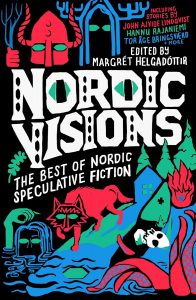Niall Harrison Reviews Nordic Visions edited by Margrét Helgadóttir
 Nordic Visions, Margrét Helgadóttir, ed. (Solaris 978-18378-60296, 341pp, $16.99, tp) October 2023.
Nordic Visions, Margrét Helgadóttir, ed. (Solaris 978-18378-60296, 341pp, $16.99, tp) October 2023.
The most haunting story in Nordic Visions is one of the shortest. “I am hanging from the lowest bar,” says the narrator of Rakel Helmsdal’s “The Abyss”, by way of introduction, “as I have been for a while now. Knowing there is nothing to see I still stare into the fog.” They cannot recall when they were first placed on the bars, which seem infinite; they have climbed up and down without finding an end. Now, they decide to give up on what little security they have and let go and fall. We follow the fall, which gradually becomes enjoyable, and eventually reveals a world beyond the bars, where the air carries “strange harmonies,” and people the narrator believes they used to know stare “with mournful, accusing eyes” from a jostling array of immense glass orbs. If it is allegory, the references are unknown to me, and unnecessary; it is strange and transporting, sufficient in itself.
Rakel Helmsdal is a Faroese writer who has published 25 books, many of them fantastical children’s books, which have been published in 19 languages, and nominated for numerous awards. As far as I can tell, “The Abyss”, which was originally published in Faroese in 1989, is the first translation of her work into English, and therefore probably the first experience of her work for most readers of Nordic Visions. Reading it gave me one of the experiences I hope for when reading an anthology: the sense of a strong voice I haven’t encountered before. It is one of the experiences often promised by the marketing of geographically themed anthologies like Nordic Visions, and in her introduction Margrét Helgadóttir leans into this approach, caveating that the countries represented – Norway (four stories), Sweden, Denmark, Finland (three each), Iceland (two), and the Faroe Islands (just Helmsdal) – of course have their own traditions, but offering some framing remarks about the “Nordic literary voice,” which in her view often features “dark humour,” “a pact with nature,” narrative voices that draw on oral traditions, and a tendency to the weird and surreal. Such analysis presumably speaks partly to Helgadóttir’s own taste, but is well evidenced by her selections, not least because she strikes an effective balance between unfamiliar and familiar names.
On the more familiar side are most, if not all, of the Swedish and Finnish selections, several of which are reprints. Sweden is represented by “She”, an efficiently professional haunted house story by John Ajvide Lindqvist; “Lost and Found”, an intermittently unsettling survival-after-crash-landing story by Maria Haskins; and by the more compelling and sustained weirdness of Karin Tidbeck’s 2013 story “Sing”, which depicts humans adapted to a parasitic ecosystem on a distant planet. From Finland, we get Emmi Itäranta’s beautiful but predictable feminist retelling of key events from the Kalevala from the point of view of Louhi, the “Mistress of the North”; Johanna Sinisalo’s “A Bird Does Not Sing Because It Has an Answer”, a typically sardonic near-future ecofiction, taken from Ann VanderMeer’s 2020 XPRIZE online anthology; and Hannu Rajaniemi’s 2010 posthuman fantasia “Elegy for a Young Elk”. This last story, in which a father travels into a Helsinki transformed by nanotech (“It turns the world soft”), is probably one of the best-known pieces in the book, but it was a little sobering to realise that despite its visual inventiveness and a strong emotional throughline, it is starting to feel unavoidably like one of yesterday’s tomorrows. The singularity ain’t what it used to be.
The writers from Iceland, Denmark, and Norway are less familiar to me, but most of the stories are worthwhile. Of particular note, from Denmark, Kaspar Colling Nielsen’s “The False Fisherman” is a witty piece of deadpan surrealism, in which a man starts taking on the trappings of a fisherman – buying all the gear – and in doing so becomes a better and more impressive man without ever actually doing any fishing; while Jakob Drud’s lively “Heather Country” is Paul Di Filippo-esque gonzo SF, in which an investigator has a biologist’s head implanted in his shoulder so that he can fully investigate the case of a missing farmer’s son. The Norway selection includes Tone Almhjell’s “The Cormorant”, a historical fantasy about a child unravelling the bargain her mother has made, filled with writing that is attentive to both the natural and human worlds around her, as well as “A Lion Roars in Longyearbyen”, one of Helgadóttir’s own stories, reprinted from Slate’s “Future Tense”, about a failure of conservation in a future warmed Arctic; its tone and focus provide an interesting contrast to Rajaniemi’s tale.
And also from Norway comes my other favourite tale, Tor Åge Bringsværd’s “As You Wish”. I was aware of Bringsværd as a major figure who has done much to shape Norwegian SF, but I’ve never had the opportunity to read his fiction before, which on this evidence is a great shame. “As You Wish” is a powerful second-person science fiction story about consent and abuse. As part of your service in the mines on Nova Thule, you are given a shapeshifting companion who is desperate to respond to your desires. They are called idunn, and are native mimics, compared to parrots; their initial story-function is to demonstrate how even nonsapient sexbots would cause their users to debase themselves. But Bringsværd adds another level to the story, because you – the protagonist – refuse to ask your idunn to change, yet all this does is unlock a further spiral into dystopia and reveal how debased the entire society has become. It’s perhaps notable that, like “The Abyss”, “As You Wish” is an older story, dating from 1992; it suggests that while Nordic Visions is a strong collection, there are many more Nordic visions yet to be discovered by English-language readers.
In Niall Harrison’s spare time, he writes reviews and essays about sf. He is a former editor of Vector (2006-2010) and Strange Horizons (2010-2017), as well as a former Arthur C. Clarke Award judge and various other things.
This review and more like it in the December and January 2023 issue of Locus.
 While you are here, please take a moment to support Locus with a one-time or recurring donation. We rely on reader donations to keep the magazine and site going, and would like to keep the site paywall free, but WE NEED YOUR FINANCIAL SUPPORT to continue quality coverage of the science fiction and fantasy field.
While you are here, please take a moment to support Locus with a one-time or recurring donation. We rely on reader donations to keep the magazine and site going, and would like to keep the site paywall free, but WE NEED YOUR FINANCIAL SUPPORT to continue quality coverage of the science fiction and fantasy field.
©Locus Magazine. Copyrighted material may not be republished without permission of LSFF.







